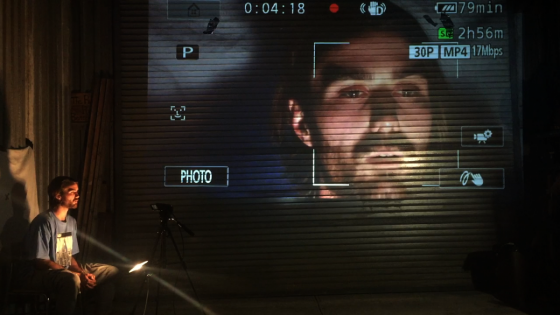
Anyone expecting from Theban Plays a straightforward modernized retelling of Sophoclean tragedies should abandon that idea. This highly experimental work, conceived and directed by Asa Horvitz and created by its performers, uses its ancient Greek antecedents, short pieces of which are read at several points, as a jumping-off point for a tapestry of monologues, video, audio and music, and even painting. Taken together, these elements bring lines of thought inspired by its sources to bear on an interrogation of aspects of the modern condition.
Theban Plays is structured as three main sections, each centered on a version of a character from Sophocles. All three, "Oedcast," "Jocasta/Colonus," and "Antigone," decontextualize their speakers as residents of contemporary NYC. The Oedipus figure (Ryan Pater) in "Oedcast" arrived in the city with dreams of musical stardom -- a dream trajectory, as he points out, pre-set by and for many others--but has turned to webcasting in the face of his lack of success. Much of this segment erases the lines between performer and the fully-lit audience and between onstage and off, and Pater is not afraid to spin out uncomfortable silences following questions, some of which are, yes, Oedipal in nature. A portion in which video overlaps with a live, mechanically inflected interior monologue, addresses the desire to understand those that lash out violently, the existence of those impulses in everyone, and the social proscription against speaking about either of these things, before it moves into "Oedcast's" final, audio-driven crescendo.
The central figure of "Jocasta/Colonus" (Eliza McKelway) is also an aspiring artist. She describes her ideal, bi-coastal fulfillment of that aspiration while an overlapping voice details among other things a trip to a remote midwestern Planned Parenthood. A large part of the "Colonus" section, which brings all three performers together, demands that the audience stop, relax, and watch the process of a painting being remade (and made collaboratively, like this play, and like theater in general). In a way, "Colonus" makes the audience actually live Jocasta's description of her ideal. The end of the section again allows us to bear witness to the process and mechanics of artistic creation, with McKelway creating a beautiful musical interlude by looping and layering her live singing. She builds the piece upon the line "What should a man fear who is close with luck?," a translation of one of Jocasta’s lines in Oedipus Tyrannous, where she asserts that human lives are ruled by fortune.
The final segment, "Antigone," is the most straightforward in its narrative and its reworking of Sophocles. Echoing the protagonists of the first two sections, the Antigone figure here (Deidrea Hamid) has begun making films after her career track was derailed during an architecture internship. As those films play, focusing at first on natural [things] such as swaying grasses, she narrates her relationship with her brother, whom she describes as inspiring both admiration and protectiveness. As the film shots change to the buildings and cityscapes of New York, her ruminations shift to lack of belonging and death. She does not fear death, which, like her desire to care for her brother and others, strongly recalls the Classical Antigone. Rather than a prince who has died in attempted treason coupled with fratricide, this version of her brother has been shot to death, presumably by the authorities, after detonating a bomb. Again echoing the earlier characters, this Antigone wants to understand things that we are not supposed to discuss and remains steadfast in her love for her brother. (The situation calls to mind Amanda Palmer’s widely criticized poetry about one of the Tsarnaev brothers in the wake of the Boston Marathon bombing.) In the end, Hamid’s Antigone wordlessly embraces and struggles with the earth and the grave.
As the various types of echoes accumulate in Theban Plays, themes emerge. We have already mentioned the recurrent inclusion of the artistic process. Additionally, taboos, socially impermissible thoughts, play a part in all three sections. In "Oedcast," these include the desire for chaos and thoughts of violence; in "Antigone," it is admiring the commitment to death, of the self and of other, for an ideal (based partly on her discomfort with relativism). The desire for liberation appears repeatedly as well, in different guises, whether “Jocasta’s” wish to end her art’s dependence on money or "Antigone's" admonition to fight pressures, to fight our economic reality, to fight fear.
Theban Plays is best recommended to those willing to give themselves over to the experience, to go along for the deliberately-paced ride, replete with pauses and silences, and see where it takes them. It is not a play that is asking to be liked. The director comments in supplementary material that the oracular pronouncement that causes Oedipus’s parents to cast him out contains a "host of other koranic possibilities to be lived with and pondered, allowed to work on the imagination instead of acted upon," and Theban Plays asks the audience too to do significant interpretive work. For those willing to engage in it, that work has its rewards. - Leah Richards & John Ziegler
